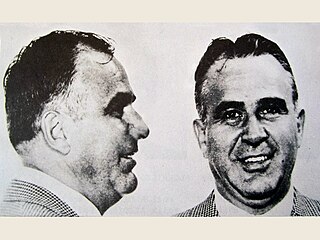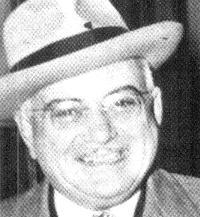
John Donato Torrio was an Italian-born American mobster who helped build the Chicago Outfit in the 1920s later inherited by his protégé Al Capone. Torrio proposed a National Crime Syndicate in the 1930s and later became an adviser to Lucky Luciano and his Luciano crime family.
William Morris ("Willie") Bioff was a Jewish-American organized crime figure who operated as a Chicago pimp and corrupt union leader between the 1920s and the 1940s. Using his position as head of the movie production workers' union, Bioff helped Chicago Outfit boss Frank Nitti successfully extort millions of dollars from Hollywood film studios by using the threat of a general strike that would paralyze the American film industry.
Ragen's Colts was a chiefly Irish street gang which dominated the Chicago underworld during the early twentieth century. By the late 1920s and early 1930s, the gang became part of the Chicago Outfit under Al Capone.
Chicago, Illinois, has a long history of organized crime and was famously home to the American mafia figure Al Capone. This article contains a list of major events related to organized crime.

Felix Anthony "Milwaukee Phil" Alderisio was an American enforcer, bagman, hitman and burglar for the Chicago Outfit. He was underboss to Sam Giancana during the 1960s and boss from 1967 to his imprisonment in 1969.

Gus Alex was an American mobster affiliated with the Chicago Outfit, who succeeded Jake Guzik and Murray Humphreys as the Outfit's main political briber and "fixer".
Salvatore Joseph "Sam" Battaglia was an American mobster and high-level member of the Chicago Outfit criminal organization.
James "Mad Bomber" Belcastro was a Black Hand gang member, extortionist, and later chief bomber for the Chicago Outfit during Prohibition.

Louis "Little New York" Campagna was an American gangster and mobster and a high-ranking member of the Chicago Outfit for over three decades.
Salvatore "Frank" Capone was an Italian-American mobster who participated in the attempted takeover of Cicero, Illinois by the Chicago Outfit. He worked in the businesses with his brothers Al Capone and Ralph Capone.
Ralph James Capone was an Italian-American mobster and an older brother of Al Capone and Frank Capone. He got the nickname "Bottles" not from involvement in the Capone bootlegging empire, but from his running the legitimate non-alcoholic beverage and bottling operations in Chicago. Further family lore suggests that the nickname was specifically tied to his lobbying the Illinois legislature to put into law that milk bottling companies had to stamp the date that the milk was bottled on the bottle. He was most famous for being named by the Chicago Crime Commission "Public Enemy Number Three" when his brother Al was "Public Enemy Number One".
William Daddano Sr., also known as "William Russo" and "Willie Potatoes," was a top enforcer and loan shark for the Chicago Outfit and a participant in some high-profile robberies.
Joseph Esposito was an American politician best known for his involvement in bootlegging, extortion, prostitution and labor racketeering in Chicago, Illinois during the Prohibition era.
William Jack "Three Fingers" White was a Prohibition gangster and member of the Chicago Outfit.
Joseph Francis Saltis, known as "Polack Joe", was a Rusyn American Prohibition era organized crime boss who, with Frank McErlane, operated an illegal bootlegging crime family in the Back of the Yards neighborhood of Chicago, until his territory was seized by Al Capone and the Chicago Outfit. Saltis then retired to Wisconsin.

Lawrence "Dago Lawrence" Mangano was a Chicago organized crime figure and member of the Chicago Outfit during the 1920s to the 1940s. He was a relative of Joseph Mangano and Philip Mangano, of Chicago, and a suspected relative of New York City Mafia Boss Vincent Mangano.
Antonio "Tony the Scourge" Lombardo was an Italian-born American mobster. He was consigliere to Al Capone, and later the President of the Unione Siciliana.
Jake "Greasy Thumb" Guzik was the financial and legal advisor, and later political "greaser," for the Chicago Outfit.

John U. Zuta was an accountant and political "fixer" for the Chicago Outfit and the North Side Gang.
Walter Stevens (1877–1931) was a freelance enforcer and "hitman", popularly known as "dean of the Chicago gunmen", during Prohibition. Although having the reputation of a violent gangster, credited with the deaths of at least 60 men, Stevens was a devoted husband to an invalid wife and his three adopted children. Stevens was uncharacteristically cultured compared to his fellow gangsters, refraining from drinking and reportedly quoting classical literature from authors such as Robert Louis Stevenson and poet Robert Burns.






